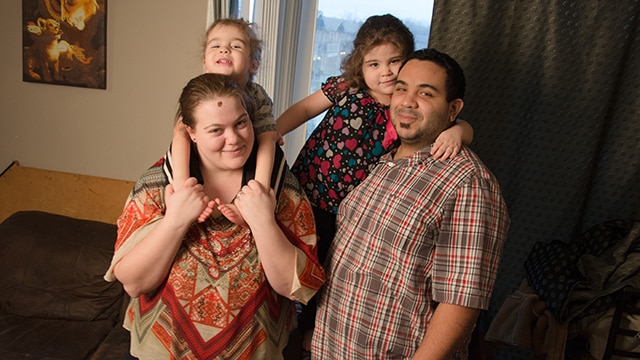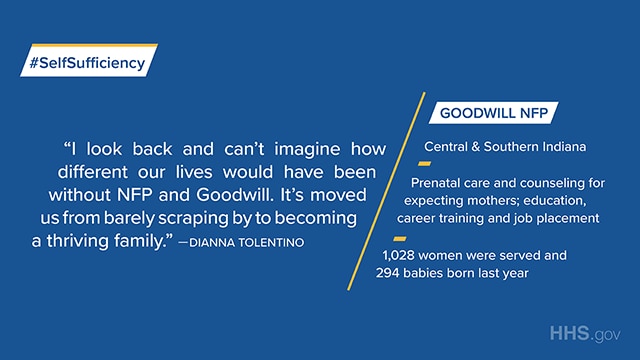September 28, 2018
Summary:
Goodwill NFP in Indiana is one of many initiatives across the nation funded by HHS to help low-income families become healthy and financially self-sufficient.
Consistent with President Trump’s Executive Order on Reducing Poverty in America by Promoting Opportunity and Economic Mobility, HHS’s Strategic Plan sets goals for HHS to encourage self-sufficiency and personal responsibility, and eliminate barriers to economic opportunity (Objective 3.1) and to support strong families and healthy marriage, and prepare children and youth for healthy, productive lives (Objective 3.3). This blog is part of the Self-Sufficiency Series: Solutions from the Field, which profiles local programs from across the country finding solutions to accomplish these goals.
Collaborations across the nation receive support from the Maternal, Infant, and Early Childhood Home Visiting Program (MIECHV) of HHS’s Health Resources and Services Administration (HRSA). The various initiatives aim to meet the department’s Strategic Plan goals to encourage self-sufficiency and personal responsibility, while improving health outcomes for individuals like Dianna Tolentino, and her husband Luis.
These two Indiana residents were expecting their first child, and were just getting by, both working low-level jobs at fast food restaurants. But a referral by her doctor to the Nurse-Family Partnership (NFP) has changed the course of her family’s future. NFP and Goodwill of Central and Southern Indiana - PDF have joined hands to improve the health of low-income, first-time mothers and their babies and to strengthen the economic stability of their families.
This particular MIECHV-funded program, Goodwill NFP, is one of many efforts across the nation that receives support from MIECHV. The various initiatives aim to meet the department’s Strategic Plan goals to encourage self-sufficiency and personal responsibility, while improving health outcomes. NFP is a national program that has a presence in 42 states and currently serves more than 34,000 families. Goodwill implements the Goodwill NFP program in 30 counties in Indiana.
Under this particular MIECHV-funded program, Goodwill NFP focuses on education and employment. Moms—and dads—lacking high school diplomas can enroll in one of Goodwill’s adult tuition-free high schools—The Excel Center and receive support through with tutors, child care, internships and life coaches, all at no cost. Goodwill’s in-house TalentSource is available to help program participants find higher-wage jobs.
HHS has set a goal to prepare children for healthy, productive lives, and programs like this contribute to this goal. “Education is one of the biggest social determinants of stability and good health,” said Betsy Delgado, vice president, mission and education initiatives, of Goodwill of Central and Southern Indiana, who told me, “We know children will do better if they are children of solid families.”

Tolentino Family: Goodwill NFP graduate Dianna with husband Luis, son Drakeo and daughter Rain. Photo courtesy of Goodwill
Under this MIECHV-funded program, Goodwill NFP also pairs first-time mothers-to-be with a nurse who visits them at their home and tracks their health and their child’s development to the age of 2. Abby O’Connor, an RN who was Dianna’s nurse, monitored her vital signs, made sure she made her pre-natal care appointments, advised her on baby care, and generally taught her how to have a healthy pregnancy. Dianna and Abby told me that they talked a lot about Dianna’s goals for herself and her family. Fathers and other family members can also participate, if the mother wants them to. Abby said Luis became involved in the home visits and attended The Excel Center, earning his high school diploma and a clinical medical assistant certification.
“Our nurses become a big part of a support system that young, first-time mothers often don’t have,” Abby said. “We help moms be their best self.”
According to Goodwill, only 45 percent of the participants were working before joining the program, while more than 68 percent were working by the time their child had turned 2 years old. Last year, within a year of enrollment, 66 percent of households had an increase in income and benefits. Goodwill program data also show that in 2017, 91.3 percent of the moms who participated in the initiative delivered full-term; 89.5 percent of the babies had a normal birth weight and nearly 100 percent of the women quit or reduced tobacco use before their child’s birth. Goodwill NFP said these outcomes help set children up for healthy lives, as HHS works every day to do.
Dianna credits Abby’s care and their close relationship with her successful pregnancy. When Abby suspected complications, she made sure Dianna went to her doctor, who determined that she had a condition that would lead to a significantly early delivery, and without medical intervention would endanger both mother and baby.
They now have a healthy daughter and son. And Dianna credits Goodwill NFP for helping her family become more financially stable. Dianna said she now has a job in administration at The Excel Center and is working with a Goodwill coach to increase her financial literacy. “I have no credit history and I didn’t know how to budget,” she explained. Luis has the option of using his certification for a job at a hospital, but he’s working as a chef, which is his long-term goal, Dianna said.
Every day, MIECHV-funded programs help couples like Dianna and Luis move toward self-sufficient and healthy families.
“Without this help [from Goodwill and NFP], it would have been rough. There was not much wiggle room in our lives,” Dianna said. “I look back and can’t imagine how different our lives would have been without NFP and Goodwill. It’s moved us from barely scraping by to becoming a thriving family.”
This effort is just one of countless examples of MIECHV-funded programs across the country working to eliminate barriers to economic opportunity and prepare children for healthy, productive lives. HRSA announced on September 27 approximately $361 million in funding to Indiana and 55 other states, territories and nonprofit organizations through the MIECHV Program. These funds support communities providing voluntary, evidence-based home visiting services to women during pregnancy and to parents with young children up to kindergarten entry.

https://www.hhs.gov/blog/2018/09/28/getting-to-self-sufficiency-by-tackling-health-and-financial-stability.html
No comments:
Post a Comment